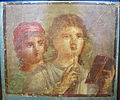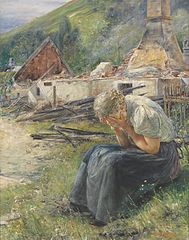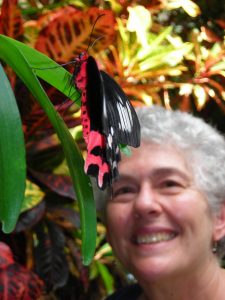I’m researching fairy tale retellings right now, so I want to start this post with Once Upon a Time. The story has a fairy tale element to it. It starts with a dream and ends with a happy surprise. It is, however, no fairy tale. Let me start it with the right words anyhow, because I can.
Once Upon a Time I had a dream. It was only a little dream. I woke up with an image from it so firmly imprinted into my vision memory, that, even before I had coffee, I went to my computer. I looked to see if I could find a picture of Io, because my dream was looking up at Io through an old telescope and seeing it as if it were our moon.
I found the picture almost immediately. Io looked the way my mind had dreamed it. I don’t remember if I took time for coffee, or if I wrote the story immediately, but by the end of the day I had a first draft of a story set in a far-distant planet, where a society re-enacted the eighteenth century.
I was chatting with a friend and told her about it. She read my draft. Then she told me her dream, which was to run a magazine. I let her have my story to use to build that magazine. She set up the organisation and edited everything and I and a couple of other friends built a world writers and artists could play in. That world was New Ceres. My story was its backbone and its heart, but it was never published. Life got in the way.
I took my version of New Ceres because I had new dreams about what could happen on that planet. Alisa took hers and she published a lovely anthology. She then started a publishing house and that publishing house has put out amazing book after amazing book. I watch to see where her dreams taker her next, because they’re always to fascinating places.
My dreams took a while to realise. First, I wrote them into a novel. An editor from a well-known science fiction press asked if I could send it to him. Whenever I asked about how he was going with it, I was told that it would be read the next week, that it was a priority, that I should not worry. Eight years later I took my manuscript back, and resolved to try elsewhere.
The novel was accepted somewhere else almost immediately, but that publisher imploded. Another publisher took it on. They asked one of my favourite artists to do the cover and he built (literally, built) a scene from the novel, and photographed it. A street from New Ceres lives in the Blue Mountains.
My novel was released straight into the first COVID inversion, where no-one looked for new novels by small press on the other side of the world. It was going to be celebrated at WorldCon in New Zealand. New Zealand is so close and so friendly and… the pandemic changed that, too. At least, I thought, it was finally published. I could close that chapter on those dreams and move on. Its final name was Poison and Light. Here, have a link to it. Admire the cover.
Tonight I had news about the novel I thought no-one could read because all the publicity and distribution were hit so hard by the pandemic that it simply wasn’t very visible. It’s been shortlisted for an award.
In that short-list are novels by wonderful writers whose work was issued by that first publisher. The editors won’t remember the eight years I had to wait, nor the emails that went unanswered in the last year, when I tried to find out what was happening. I remember. And now, finally, I know that the initial request to see the novel was serious. That it was an unlucky novel, but not one that was poorly written. And that readers are finding it, despite its travails.
I shall dream again tonight of that acned moon. And, finally, I will move on.

 The internet is practically an engraved invitation to indulge in gossip and rumor. It’s so easy to blurt out whatever thoughts come to mind. Once posted, these thoughts take on the authority of print (particularly if they appear in some book-typeface-like font). Have you ever noticed how much easier it is to question something when it appears in Courier than when it’s in Times New Roman? For the poster of the thoughts comes the thrill of instant publication. Only in the aftermath, when untold number have read our blurtings and others have linked to them, not to mention all the comments and comments-on-comments, do we draw back and realize that we may not have acted with either wisdom or kindness.
The internet is practically an engraved invitation to indulge in gossip and rumor. It’s so easy to blurt out whatever thoughts come to mind. Once posted, these thoughts take on the authority of print (particularly if they appear in some book-typeface-like font). Have you ever noticed how much easier it is to question something when it appears in Courier than when it’s in Times New Roman? For the poster of the thoughts comes the thrill of instant publication. Only in the aftermath, when untold number have read our blurtings and others have linked to them, not to mention all the comments and comments-on-comments, do we draw back and realize that we may not have acted with either wisdom or kindness. The COVID-19 pandemic has been raging for many months now, marked from the onset by lies about the disease, its origins, its treatment, and its prevention. No aspect of the pandemic has been free from controversy and misinformation. In the middle of flame wars and whack-a-mole efforts to squelch anti-vaccine, anti-mask internet sites lies the confusion and grief of those who have lost loved ones to this disease (over 700,000 in
The COVID-19 pandemic has been raging for many months now, marked from the onset by lies about the disease, its origins, its treatment, and its prevention. No aspect of the pandemic has been free from controversy and misinformation. In the middle of flame wars and whack-a-mole efforts to squelch anti-vaccine, anti-mask internet sites lies the confusion and grief of those who have lost loved ones to this disease (over 700,000 in 
 A confession: I like to read at bedtime. In this company, that’s nothing unusual. All the sleep hygiene experts say not to, that beds should be used for sleeping and only one other activity. What do they know? I find something deeply comforting about curling up with a good–but not too exciting–book. Perhaps it evokes memories of my mother reading aloud to me, or it’s just “me time.”
A confession: I like to read at bedtime. In this company, that’s nothing unusual. All the sleep hygiene experts say not to, that beds should be used for sleeping and only one other activity. What do they know? I find something deeply comforting about curling up with a good–but not too exciting–book. Perhaps it evokes memories of my mother reading aloud to me, or it’s just “me time.”